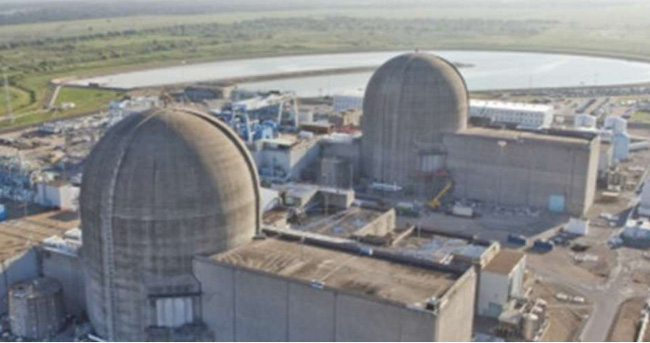As Historic Flooding Grips Texas, Groups Demand Nuclear Plant Be Shut Down
Tuesday, August 29, 2017
Jon Queally, staff writer
Common Dreams
"This storm and flood is absolutely without precedent even before adding the possibility of a nuclear accident that could further imperil millions of people who are already battling for their lives."

The South Texas Project nuclear power facility in Bay City, Texas could be under extreme threat from historic flood waters, groups warned on Tuesday. (Photo: STP)
As record-breaking rainfall and unprecedented flooding continue to batter the greater Houston area and along the Gulf coast on Tuesday, energy watchdogs groups are warning of "a credible threat of a severe accident" at two nuclear reactors still operating at full capacity in nearby Bay City, Texas.
Three groups—Beyond Nuclear, South Texas Association for Responsible Energy, and the SEED Coalition—are calling for the immediate shutdown of the South Texas Project (STP) which sits behind an embankment they say could be overwhelmed by the raging flood waters and torrential rains caused by Hurricane Harvey.
"With anticipated flooding of the Colorado River, the nuclear reactors should be shut down now to ensure safety."
—Karen Hadden, SEED Coalition "Both the U.S. Nuclear Regulatory Commission and the STP operator have previously recognized a credible threat of a severe accident initiated by a breach of the embankment wall that surrounds the 7,000-acre reactor cooling water reservoir," said Paul Gunter, director of the Beyond Nuclear’s Reactor Oversight Project, in a statement by the coalition on Tuesday.
The groups warn that as Harvey—which on Tuesday was declared the most intense rain event in U.S. history—continues to dump water on the area, a breach of the embankment wall surrounding the twin reactors would create "an external flood potentially impacting the electrical supply from the switchyard to the reactor safety systems." In turn, the water has the potential to "cause high-energy electrical fires and other cascading events initiating a severe accident leading to core damage." Even worse, they added, "any significant loss of cooling water inventory in the Main Cooling Reservoir would reduce cooling capacity to the still operating reactors that could result in a meltdown."
With the nearby Colorado River already cresting at extremely high levels and flowing at 70 times the normal rate, Karen Hadden, director of SEED Coalition, warned that the continue rainfall might create flooding that could reach the reactors. "There is plenty of reserve capacity on our electric grid," she said, "so we don’t have to run the reactors in order to keep the lights on. With anticipated flooding of the Colorado River, the nuclear reactors should be shut down now to ensure safety."
Last week, the STP operators said that safety for their workers and local residents was their top concern, but that they would keep the plant operating despite the approaching storm.
Susan Dancer, president of the South Texas Association for Responsible Energy, said that as residents in Bay City—herself included—were being forced to leave their homes under manadatory evacaution orders, it makes no sense to keep the nuclear plant online.
"Our 911 system is down, no emergency services are available, and yet the nuclear reactors are still running. Where is the concern for employees and their families? Where is the concern for public safety? This is an outrageous and irresponsible decision," declared Dancer. "This storm and flood is absolutely without precedent even before adding the possibility of a nuclear accident that could further imperil millions of people who are already battling for their lives."
As Harvey hovers over the coastal region, heavy rains are expected to persist for days even as the storm system creeps toward to Louisiana in the east.
But no matter how remote the possibility, said Gunter, "it’s simply prudent that the operator put this reactor into its safest condition, cold shutdown."
This work is licensed under a Creative Commons Attribution-Share Alike 3.0 License
This document contains copyrighted material whose use has not been specifically authorized by the copyright owner. SEED Coalition is making this article available in our efforts to advance understanding of ecological sustainability, human rights, economic democracy and social justice issues. We believe that this constitutes a "fair use" of the copyrighted material as provided for in section 107 of the US Copyright Law. If you wish to use this copyrighted material for purposes of your own that go beyond "fair use", you must obtain permission from the copyright owner.


